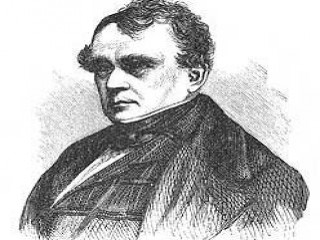
Francis Lieber biography
Date of birth : 1798-03-18
Date of death : 1872-10-02
Birthplace : Berlin, Germany
Nationality : German
Category : Politics
Last modified : 2011-05-06
Credited as : Political scientist, ,
The German-American political scientist Francis Lieber is regarded as the first practitioner of political science as a separate academic discipline in the United States and as America's first academic political philosopher.
Francis Lieber was born in Berlin on March 18, 1798. His adolescence and early manhood were spent against a background of various revolutionary upheavals and wars in Europe. In 1815 he volunteered for the Prussian army, fought in the battles of Ligny and Waterloo, was seriously wounded in the assault on Namur, contracted typhus, and nearly died. Out of these early experiences he emerged with decidedly liberal views, to the extent that he dreamed of assassinating Napoleon III.
Upon his return to Germany, Lieber became a member of the Turnverein movement, an organization of gymnastic associations founded to build strength and fellowship. They later developed as centers for fostering nationalism and German unification. Suspect for his liberalism during the general suppression of student organizations in 1819, he was imprisoned (an experience which may have led to his later interest in penology) and harassed by the police during the remainder of his residency in Germany. Prohibited from entering a Prussian university, he obtained a degree at the University of Jena.
About 1821 Lieber went to Greece, as did many European students, intellectuals, and litterateurs, to participate in the revolutionary movement for Greek independence. Appalled at the subservience of the modern Greek character, he moved on to Italy, where he spent nearly 2 years in the family of the German historian Barthold Georg Niebuhr. Lieber returned in 1824 to Germany, where he was again imprisoned. While confined he wrote a collection of poems which were later published under the pseudonym Franz Arnold. In 1826 he fled to England, where he remained almost 2 years before going to the United States and setting in Boston.
Out of Lieber's proposal to translate the Brockhaus encyclopedia into English developed the first edition of the Encyclopaedia Americana (13 vols., 1829-1833), which he edited. During this period he also lectured on politics and history in the larger cities of America and translated leading French and German scholars in the social sciences into English. At the invitation of the trustees of Girard College he developed a plan of instruction for that school which was published in 1834 and which influenced the curricula of various other leading institutions of higher learning. In 1835 he received his first academic appointment as professor of history and political economy at South Carolina College, where he remained until 1856. There he wrote the works which established his reputation as a political philosopher, especially A Manual of Political Ethics (1838-1839), Essays on Property and Labor (1841), and Civil Liberty and Self-government (1853).
Although he was teaching in the Deep South at a time when hot-blooded radicals were demanding secession, Lieber did not hestiate to advance—at no little personal risk— the organic view of the nation. According to this conception, the oneness of the nation is produced through the consciousness of a common culture, history, and destiny which is manifested in political institutions. The nation is an evolutionary growth. It is not something which is produced as a result of entering into an arbitrary contractual agreement, whether that be among individuals or among states. This organic conception of the American Union, accepted in the North, justified the claim that the Union existed in perpetuity and was indissoluble. It was the view uttered by Abraham Lincoln in his first inaugural address (and in many of his other writings). In his various writings Lieber also stressed that the English political traditions, embodying civil liberties and local self-government, derived their importance as guarantees of personal liberty from the fact that they were institutional growths, not because they were paper guarantees for certain liberties.
During the Civil War, Lieber was one of the strongest academic supporters of the Union. At the request of the general in chief, he wrote Guerilla Parties, Considered with Reference to the Law and Usages of War (which was also influential during the Franco-German War) and the influential and significant Instructions for the Government of the Armies of the United States in the Field, which became the basis for subsequent efforts to codify the international law of war; its basic principles reappear in the Hague Conventions.
Following the Civil War, Lieber was a supporter of the Radical Republicans. He wrote numerous essays on political subjects, vigorously urging, for example, free trade. An ardent nationalist and defender of civil liberties, he managed to combine the academic and the practical life through the range of his thought—from the more theoretical subjects of politics such as the nature of the state to the more practical subjects such as civil administration and guerrilla warfare.
From 1856 to his death on Oct. 2, 1872, Lieber taught at Columbia. The beginning of the academic discipline of political science is generally considered to have begun with the creation of a separate chair for Lieber at Columbia in 1857.
















